

What is Global Competency? - Teacher Abroad: A Global Education Resource Guide. What is global competency?
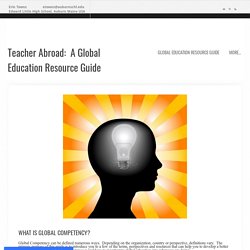
Global Competency can be defined numerous ways. Depending on the organization, country or perspective, definitions vary. Janusz Korczak. "My life has been difficult but interesting.
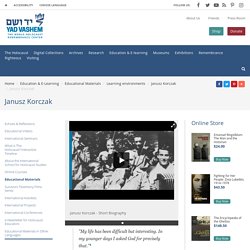
In my younger days I asked God for precisely that. " Janusz Korczak was born Henryk Goldszmit on July 22nd, 1878 to an assimilated Jewish family in Warsaw, Poland. He was an author, a pediatrician and a pedagogue. When Korczak's father, a prominent lawyer and the sole source of income of the household, died after illness in 1896, the family was left without a source of income and Korczak became the sole breadwinner for his mother, sister, and grandmother. Love Your God with All Your Mind. Note: This paper is based substantially on the work of JP Moreland, philosophy professor at Biola University, particularly a talk he gave called Love Your God With All Your Mind, and his book of the same name.

The culture we live in often seems to be more effective at evangelising the Church than the Church is at evangelising the culture. Apparently New Zealand is the world’s second most secular society (France ranks at #1). Why is the Church often so ineffective? Even in NZ there are lots of Catholics (and other Christians) but perhaps our influence isn’t proportionate to our numbers. We all know society is going downhill but it’s a lot easier to complain about that than to do something about it. Looking at history, has the situation we have now always been the case? The God that we worship is not stupid. But as you know, today we often don’t make decisions based on careful thought. Now in a culture like that, what’s going to happen? …by what? Foodsaroundtheworld2. Explore STEM Resources for K-12 Educators. Globalpostcardpoetry. During this Global Learning Project(GLP), students learn about short forms of poetry and create a digital postcard with their own short poem.
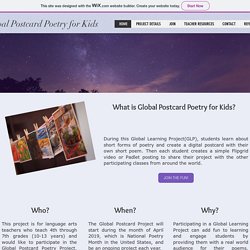
Then each student creates a simple Flipgrid video or Padlet posting to share their project with the other participating classes from around the world. This project is for language arts teachers who teach 4th through 7th grades (10-13 years) and would like to participate in the Global Postcard Poetry Project. Talking Kites Around the World. A tradition of flying kites with personal and group images of our dreams for a better world,in the footsteps of J.
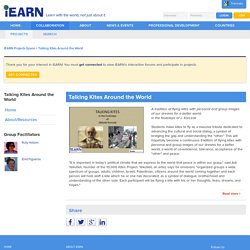
Korczak Students make kites to fly as a massive tribute dedicated to advancing the cultural and social dialog, a symbol of bridging the gap and understanding the "other. " This will hopefully become a continuous tradition of flying kites with personal and group images of our dreams for a better world, a world of co-existence, tolerance, acceptance of the "other" and peace. "It is important in today's political climate that we express to the world that peace is within our grasp," said Adi Yekutieli, founder of the 10,000 Kites Project. Yekutieli, an artist, says he envisions "organized groups a wide spectrum of groups, adults, children, Israeli, Palestinian, citizens around the world coming together and each person will hold aloft a kite which he or she has decorated, as a symbol of dialogue, brotherhood and understanding of the other side.
Globalpostcardpoetry. Step 1: Teachers can sign up to participate by going to the Join page and filling out the requested information (i.e. your name, email, grade level, school name, and location).
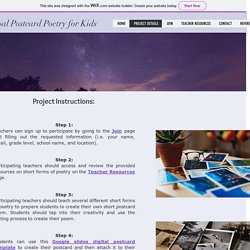
Step 2: Participating teachers should access and review the provided resources on short forms of poetry on the Teacher Resources page. Step 3: Participating teachers should teach several different short forms of poetry to prepare students to create their own short postcard poem. Step 4: Foodsaroundtheworld2. Join this Global Learning Project to help our students better understand what they eat at school and to learn about the different cultural backgrounds around the world!
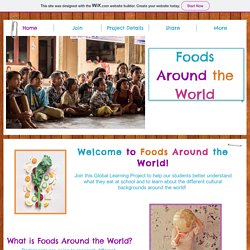
Participants are going to research different types of foods each schools eat around the world and participants are going to master how to write a five sentence paragraph. Also, participants will master how to insert an image of their favorite types of food they eat during lunch at their school. Participants will learn about the different foods schools provide depending on their cultural backgrounds. This is a great, simple and possibly eye opening experience for kids. Home - Compassion Games International. Twitter for the #GlobalEducator. Twitter has become a vibrant venue where educators around the world connect and share ideas—in 140 or fewer characters at a time.
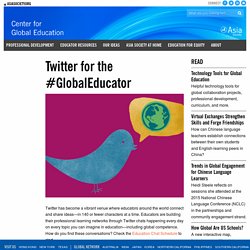
Educators are building their professional learning networks through Twitter chats happening every day on every topic you can imagine in education—including global competence. How do you find these conversations? Check the Education Chat Schedule to start. The other way to connect is through the use of hashtags. Hashtags allow you to connect with people you probably don’t know, but who are passionate about the same things. Here are eight types of hashtags for educators who teach and learn about the world: The global learning community Use #globaled, #globallearning, or #globaledchat to find other educators who are dedicated to building student global competence.